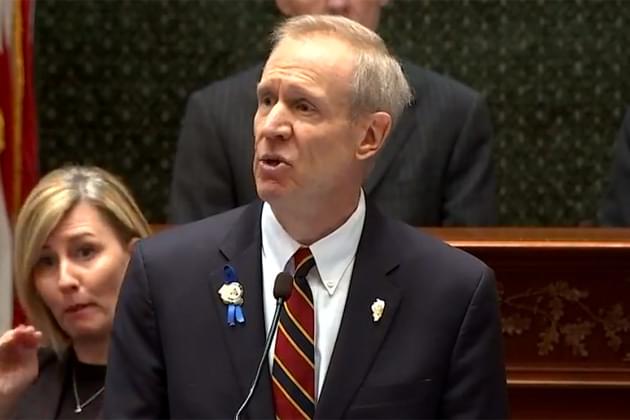
By Greg Bishop/Illinois Radio Nework
SPRINGFIELD – Critics of Gov. Bruce Rauner’s budget address say the proposal to shift the cost of pensions to school districts and universities will bring about a massive property tax increase.
State Rep. David McSweeney, R-Barrington Hills, said Wednesday’s budget address was the worst proposal to date because it uses the tax increase imposed on taxpayers last year.
“He allegedly opposed the [Speaker Michael] Madigan tax increase but he’s using the revenues,” McSweeney said. “It proves that he was for it.”
Rauner did propose reducing the recent $5 billion tax increase, but only by $1 billion.
Rauner also proposed phasing in over several years the cost of pensions back to local school districts and public universities.
Treasurer Michael Frerichs said the governor’s proposed pension cost shift would bring about the largest property tax increase in state history.
“The governor has talked about cutting income taxes and cutting property taxes, but what I heard [Wednesday] was a budget that spends just about every dollar of the last income tax increase while also shifting burdens to local school districts,” Frerichs said.
McSweeney also criticized the pension cost shift as a “massive property tax increase … and a cut in education spending and no real reform, no real pension reform.”
Ted Dabrowski, president of fiscal watchdog Wirepoints.com, local governments should be paying for their employees’ pensions.
“Gov. Rauner deserves credit for taking on state healthcare costs and giving local governments more power to control their costs,” Dabrowski said. “His proposal to shift the normal cost of pensions back to school districts and universities is also the correct move. However, his spending proposal appears to offset the shift with additional funding to education, which negates the effectiveness of the reform.”
State Sen. Dan McConchie, R-Hawthorn Woods, said the pension cost shift should hold school districts and universities more accountable for generous salaries.
“We’re going to see a continual spiral out of control of salaries especially in some of the richest districts throughout the state,” McConchie said. “So something needs to happen in regards to this.”
Senate President John Cullerton’s office put out a statement that said the governor’s budget proposal “calls for increasing public school funding by $350 million, which is the increase required by the new formula the governor considers his top accomplishment. But his proposal then wipes out the increase by dumping nearly $500 million in state retirement costs onto local schools. Public education ends up losing under the Rauner plan.”
“It’s almost like he doesn’t know what his budget does,” Cullerton said. “I can’t explain the disconnect. It seems intentionally deceptive and it’s troubling.”
Senate Minority Leader Bill Brady, R-Bloomington, said there are things he doesn’t like about the proposed budget, but gave it good marks overall and said it’s balanced. He said Rauner is the best salesman he’s ever seen in Illinois, but “he needs better tools to do even more.”
Rauner called for reforms to grow the state’s economy more than the rate of government spending, but similar calls in prior years haven’t resulted in reforms the business community says are needed. His budget plan calls for the state to spend $37.6 billion on $38 billion in revenue if his reform measures pass, which is unlikely.
State Sen. Jason Barickman called Rauner’s proposal bold, but reasonable.
“It has merit,” Barickman said. “If Democrats are going to say today that they don’t support some of they same ideas they’ve put forward in prior years, I think the public will call them out on that.”
State Rep. Dan Brady, R-Bloomington, said getting a budget deal done will take compromise.
“We need to recognize that we are in the minority party, and recognize the fact we can work with the majority party and find some common ground and that is going to be the maybe smaller steps that are good for workers compensation reforms,” Brady said.
It’s now up to budgeteers to craft and pass a balanced budget, something that hasn’t happened in years.
The next budget year begins July 1.






